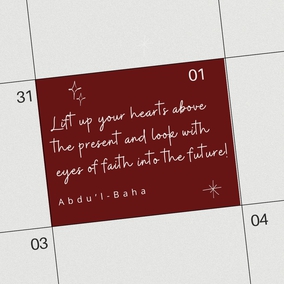The views expressed in our content reflect individual perspectives and do not represent the authoritative views of the Baha'i Faith.
There are only four accepted methods of comprehension—that is to say, the realities of things are understood by these four methods.
The first method is by the senses—that is to say, all that the eye, the ear, the taste, the smell, the touch perceive is understood by this method. Today this method is considered the most perfect by all the European philosophers: they say that the principal method of gaining knowledge is through the senses; they consider it supreme, although it is imperfect, for it commits errors. For example, the greatest of the senses is the power of sight. The sight sees the mirage as water, and it sees images reflected in mirrors as real and existent; large bodies which are distant appear to be small, and a whirling point appears as a circle. The sight believes the earth to be motionless and sees the sun in motion, and in many similar cases it makes mistakes. Therefore, we cannot trust it.
The second is the method of reason, which was that of the ancient philosophers, the pillars of wisdom; this is the method of the understanding. They proved things by reason and held firmly to logical proofs; all their arguments are arguments of reason. Notwithstanding this, they differed greatly, and their opinions were contradictory. They even changed their views—that is to say, during twenty years they would prove the existence of a thing by logical arguments, and afterward they would deny it by logical arguments—so much so that Plato at first logically proved the immobility of the earth and the movement of the sun; later by logical arguments he proved that the sun was the stationary center, and that the earth was moving. Afterward the Ptolemaic theory was spread abroad, and the idea of Plato was entirely forgotten, until at last a new observer again called it to life. Thus all the mathematicians disagreed, although they relied upon arguments of reason. In the same way, by logical arguments, they would prove a problem at a certain time, then afterward by arguments of the same nature they would deny it. So one of the philosophers would firmly uphold a theory for a time with strong arguments and proofs to support it, which afterward he would retract and contradict by arguments of reason. Therefore, it is evident that the method of reason is not perfect, for the differences of the ancient philosophers, the want of stability and the variations of their opinions, prove this. For if it were perfect, all ought to be united in their ideas and agreed in their opinions.
The third method of understanding is by tradition—that is, through the text of the Holy Scriptures—for people say, “In the Old and New Testaments, God spoke thus.” This method equally is not perfect, because the traditions are understood by the reason. As the reason itself is liable to err, how can it be said that in interpreting the meaning of the traditions it will not err, for it is possible for it to make mistakes, and certainty cannot be attained. This is the method of the religious leaders; whatever they understand and comprehend from the text of the books is that which their reason understands from the text, and not necessarily the real truth; for the reason is like a balance, and the meanings contained in the text of the Holy Books are like the thing which is weighed. If the balance is untrue, how can the weight be ascertained?
Know then: that which is in the hands of people, that which they believe, is liable to error. For, in proving or disproving a thing, if a proof is brought forward which is taken from the evidence of our senses, this method, as has become evident, is not perfect; if the proofs are intellectual, the same is true; or if they are traditional, such proofs also are not perfect. Therefore, there is no standard in the hands of people upon which we can rely.
But the bounty of the Holy Spirit gives the true method of comprehension which is infallible and indubitable. This is through the help of the Holy Spirit which comes to man, and this is the condition in which certainty can alone be attained.
Abdul-Baha (Some Answered Questions, pp 297-299)
















Comments
Sign in or create an account
Continue with Googleor